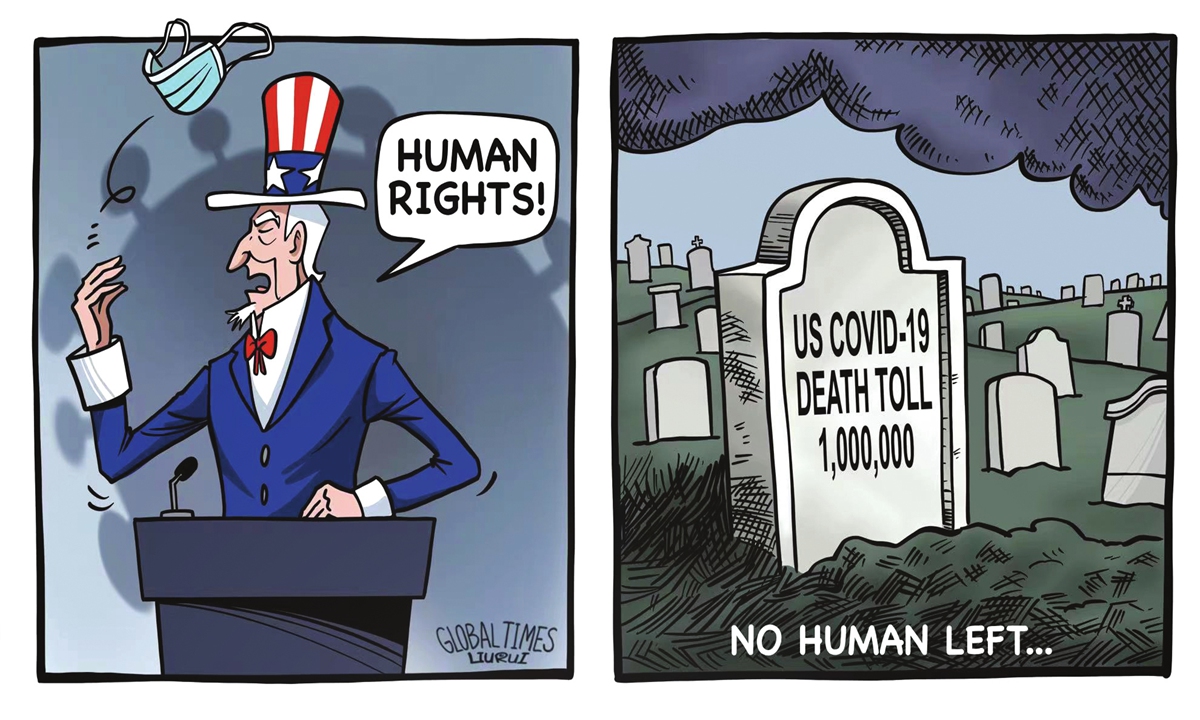
Illustration: Liu Rui/GT
The death toll in the US from COVID-19 has surpassed 1 million, according to NBC News' tally. The figure is the highest in the world in one country, and experts said such a massive cost of human lives reflects the failure of the US response to the pandemic and the incompetence of its government.
Some other institutes like Johns Hopkins University (JHU) recored slightly smaller numbers of the US' death toll, which were also approaching 1 million by Sunday.
The US has become the world's "biggest failed country" on COVID response due to the politicization of the epidemic, conflicting policies, and social disintegration, experts noted.
"The response to the epidemic is a matter of political capacity, the determination of the top leadership, and the ability of a country's political system to adapt to this determination. Unfortunately, the US made a wrong choice," Lü Xiang, research fellow at the Chinese Academy of Social Sciences, told the Global Times on Sunday.
US health experts have also reflected on the country's failed response to the pandemic. The death toll did not have to be this bad, and the pandemic response could have been much better handled, Dr. Amesh Adalja, a senior scholar at the Johns Hopkins University Center for Health Security in Baltimore and spokesperson for the Infectious Diseases Society of America, told TODAY, a US media outlet.
Timely and widespread testing is crucial to isolate infected people, but there were constant problems including faulty test kits, delayed test results, bottlenecks in labs and long lines at testing sites before at-home COVID tests became available, the US media noted.
Instead of focusing on epidemic prevention and control, the US government has released false information to mislead the public. Since the beginning of the pandemic, former US president Donald Trump told the public that "It's going to disappear. One day, like a miracle, it will disappear." Trump said so at the White House on February 27, 2020, as the virus marched across Asia and Europe.
Anthony Fauci, director of the US National Institute of Allergy and Infectious Diseases, warned days later that he was concerned that "As the next week or two or three go by, we're going to see a lot more community-related cases." The facts proved him right.
Observers noted that at home, some politicians are trying to downplay the harm caused by the epidemic, pushing for measures contrary to the advice of public health experts, politicizing scientific issues and creating social tensions. At the same time, politicians are trying to shift the blame and stigmatize other countries.
On May 26, 2021, President Joe Biden ordered an intelligence review of what he said were two equally plausible scenarios of the origins of the COVID-19. However, the 17-page report from the Office of the Director of National Intelligence offered no new conclusions. In the statement, which is a little more than 300 words, "Intelligence Community" is mentioned six times, but no trace of "science" is found.
As Adalja said, some of the biggest mistakes happened at the start of the pandemic in early 2020, when the US government chose "evasion" rather than a proactive approach, giving the virus a head start to spread.
On October 21, 2020, CNN published an article titled Weird science: How a 'shoddy' Bannon-backed paper on coronavirus origins made its way to an audience of millions. The article exposed the insidious intention of US politicians to smear China on the origins of COVID-19.
"After seeing how China's zero-COVID policy has saved many lives, the biggest challenge for the US is how to rationalize its huge death toll," Lü said. "Why does the US, the most developed country in the world, have more than a million deaths? They have no answer to their people, so they choose to pass the buck and divert the public's attention."
The tragedy of the US is not just that a million people have died, but that the country is incapable of self-reflection. "On the issue of fighting the epidemic, the US government can only discuss whether it supports or does not support a certain statement, but its reflection on how to build the capacity of a system is far from enough." Lü noted.




